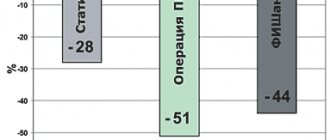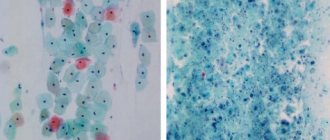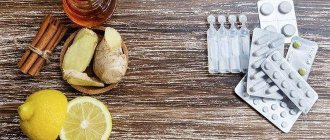“Effective treatment for HPV” - false or true?
It is important to understand that there are no serious and complete studies on any of the above drugs - randomized, double-blind, placebo-controlled trials. Advertising and laudatory publications and studies with non-representative samples are posted only on manufacturers’ websites and Russian-language resources. Apart from the CIS countries, these funds are not registered and are not used anywhere.
Many Russian gynecologists claim that drugs with unproven effectiveness successfully treat HPV: the test for the virus becomes negative after one or several courses. But this result is not a merit of the treatment; it means that the infection was transient and would have gone away on its own, even without the unnecessary drug and financial burden.
World practice
The US Center for Disease Control writes that specific therapy for HPV is not recommended. WHO in its fact sheet only talks about the need to treat the consequences that HPV can cause: cervical cancer, anal or genital warts. In men, oncogenic types of HPV can cause cancer of the rectum and penis.
In the modern world, there is no drug therapy, but much attention is paid to vaccination.
HPV vaccination
Two vaccines have undergone clinical trials and are registered on the market:
- Gardasil - protects against HPV 6, 11, 16, 18;
- Cervarix - protects against HPV types 16 and 18.
The drugs are very expensive (the price of one injection is about 6,000 - 10,000 rubles), so only developed countries can afford mass vaccination.
Ideally, all adolescents aged 11-12 years, regardless of gender, should be vaccinated (twice within six months) and adults under 26 years of age (three times after 14 years of age within six months). Russian vaccine instructions recommend three-time vaccination at any age.
Separately, it is worth mentioning that the American Alliance of Immunologists recommends vaccination against HPV for HIV. WHO, clinical studies of the Canadian Institute of Health Research and other publications speak about the effectiveness of vaccination of HIV-positive girls.
When should you get tested for HPV?
HPV testing is prescribed to women over 30 years of age with abnormal cytology or histology results. It’s just pointless and costly to carry it out like that. The results of the PAP test, together with the HPV test, help determine the correct interval before repeat cytological examination or colposcopy.
A positive HPV test does not mean cancer, it only allows you to make a rough prognosis; Moreover, the virus is not the only risk factor for cervical cancer.
The HPV test should not be used in large numbers - it is an additional (and expensive) screening method.
Result:
- There is no proven antiviral therapy for HPV, nor are there drugs that strengthen the immune system.
- It is not HPV that is treated, but its consequences: precancerous conditions and cervical cancer, neoplasms on the skin and mucous membranes. The treatment is not medicinal, but surgical: laser, cryodestruction, surgery.
- There is no need for everyone to get tested for HPV.
Allokin-alpha 1 mg 3 pcs. lyophilisate for preparing a solution for subcutaneous administration
pharmachologic effect
Antiviral, immunomodulatory agent.
Composition and release form Allokin-alpha 1 mg 3 pcs. lyophilisate for preparing a solution for subcutaneous administration
Solution - 1 amp.:
- Alloferon [Histidyl-glycyl-valyl-seryl-glycyl-histidyl-glycyl-glutaminyl-histidyl-glycyl-valyl-histidyl-glycine] 1.0 mg.
Lyophilisate for the preparation of solution for subcutaneous administration 1.0 mg.
1.0 mg per clear glass ampoule. 1, 2, 3, 5 or 10 ampoules are placed in a blister pack. 1 or 2 blister packs along with instructions for use are placed in a cardboard pack
Description of the dosage form
Lyophilized powder or porous mass of white color. Hygroscopic.
Directions for use and doses
The drug is administered subcutaneously.
The standard course of treatment for infections caused by oncogenic types of human papillomavirus includes injections of the drug at a dose of 1 mg every other day, for a total of 6 injections per course.
The standard course of treatment for recurrent herpes includes injections of the drug at a dose of 1 mg every other day, for a total of 3 injections per course.
For moderate forms of acute hepatitis B, the drug is administered after verification of the diagnosis at a dose of 1 mg 3 times a week for 3 weeks (9 injections in total).
To prepare a solution for injection, use 1 ml of 0.9% sodium chloride solution as a solvent.
Pharmacodynamics
Alloferon is an oligopeptide. The nature of the pharmacological action is most similar to interferon alpha. Alloferon is an effective inducer of the synthesis of endogenous interferons and an activator of the natural killer system, capable of stimulating the recognition and lysis of defective cells by cytotoxic lymphocytes. Experiments have demonstrated high effectiveness against infections caused by influenza A and B viruses, hepatitis B and C, herpes types 1 and 2 and human papilloma (oncogenic types). Alloferon does not have general toxicity, allergenic properties, mutagenic or carcinogenic effects, does not have embryotoxic effects and does not affect reproductive function.
Pharmacokinetics
It quickly penetrates into the blood, where it interacts with immunocompetent cells, after which determining the concentration of Alloferon is difficult due to the close structural similarity of its metabolites to blood serum proteins. An increase in interferon concentration was observed 2 hours after administration of the drug and remained at a high level (2-2.5 times higher than the usual background) for 6-8 hours, reaching the initial values by the end of the day. Increased functional activity of natural killer cells was observed within 7 days after drug administration.
Indications for use Allokin-alpha 1 mg 3 pcs. lyophilisate for preparing a solution for subcutaneous administration
Chronic papillomavirus infection caused by oncogenic human papillomaviruses, chronic recurrent herpes types 1 and 2, as part of complex therapy for the moderate (icteric) form of acute hepatitis B.
Contraindications
Hypersensitivity, pregnancy and breastfeeding (stop during treatment), severe autoimmune diseases. Childhood.
Application of Allokin-alpha 1 mg 3 pcs. lyophilisate for the preparation of a solution for subcutaneous administration during pregnancy and lactation
The drug is contraindicated during pregnancy and lactation
Contraindicated in children.
special instructions
In monotherapy, Allokin-alpha is recommended for the treatment of human papillomavirus infection caused by oncogenic types of the virus, in the absence of clinical and subclinical lesions of the cervix and anogenital area.
As part of complex therapy - for the treatment of clinical and subclinical forms of lesions of the cervix and anogenital area by human papillomavirus infection caused by oncogenic types of the virus.
Treatment of chronic recurrent herpes types 1 and 2 is recommended to begin when the very first signs of the disease appear.
For hepatitis B - no later than the 7th day from the onset of jaundice.
Impact on the ability to drive vehicles and operate machinery
If dizziness occurs, you should refrain from driving or operating machinery.
Overdose
To date, no cases of drug overdose have been identified.
Side effects Allokin-alpha 1 mg 3 pcs. lyophilisate for preparing a solution for subcutaneous administration
In some cases, weakness, dizziness, and the formation of new rash elements are possible (with a herpetic infection).
Drug interactions
In the treatment of chronic recurrent genital herpes, it can be prescribed in combination with acyclovir and its derivatives (the drugs have different mechanisms of action and complement each other in the treatment of viral infection). In acute hepatitis B, the drug is prescribed against the background of generally accepted basic therapy. No interaction with other drugs has been identified.
How is the virus transmitted?
The human papillomavirus is transmitted by contact from person to person. HPV penetrates through microtraumas of the skin and mucous membranes. The virus is most often transmitted sexually.
According to the data of Academician of the Russian Academy of Sciences, Doctor of Medical Sciences, Professor V. E. Radzinsky, Doctor of Medical Sciences, Professor I. M. Ordiyants and other researchers, up to 82% of women are considered infected two years after sexual debut; Moreover, even having one sexual partner, about 20% of women are infected.1
In the human body, HPV lives in two forms - in a “dormant” and active state. At the moment of activation, the virus enters an aggressive stage, it integrates into the DNA of the cell and starts the process of formation of defective (atypical) cells and the development of the disease.
Usually, such defective (atypical) cells with altered DNA are repaired or destroyed by the body, with the help of the immune system. But the papilloma virus has its own defense mechanism, which turns off the “alarm”, and the broken cell loses the opportunity to inform the immune system about its illness.
Our immunity continues to perceive this cell as healthy, and therefore does not prevent its division and transformation. Meanwhile, the virus seems to be hiding in a cell from the human immune system.
Forum about condylomas / Treatment of HPV with Allokin-alpha
Good evening everyone!!! I’ll tell you my story about HPV and Allokin-alpha. I’ll start from the beginning. in December 2009, after a course of treatment for ureaplasma, condylomas (13 pieces, small, judging by what they write here) appeared on the labia (there seemed to be nothing inside). Since at that moment it was not possible to see a doctor, I got an appointment only after the New Year holidays. They prescribed 6 injections of allokin-alpha every other day + epigen spray or panavir gel (I didn’t want to remove it surgically: it’s expensive, painful, and usually not effective). I pierced it and used epigen. So 2 weeks passed, the epigenes decreased slightly, but did not disappear. I tried Panavir, and 3 more appeared! Panic set in, I searched the entire Internet until I came across this forum! In my opinion, the only more or less positive one on this topic. I decided to try out all the remedies listed here. I started with iodine (I tried it on several) - there was no effect... I bought propolis tincture (on the advice of the author of one of the topics). I did everything as described, I didn’t even wash for 5 days)) I almost went crazy))) They became smaller again, but didn’t disappear... I went and bought a super cleanser, read about it on the Internet and decided to leave it as a last resort... I didn’t do anything for two weeks ..waited for the beginning of the waning moon.. Maybe this is all nonsense, of course, but in the end it helped!!! Just at this time I had a vacation and went with a friend to Egypt for a week, with full confidence that after the vacation everything would pass and I will be absolutely healthy. I bought Condilin. After one course they completely disappeared! Of course, it was very painful and uncomfortable for 4-6 days, because ulcers form and with every unsuccessful movement they are torn off, but everything went away, no traces remained!! today (April 13, 2010) I received tests!!! No traces of the virus!!! So, dear readers, to summarize, I’ll say: 1) don’t despair!!! You need to think positively, and the body itself will help get rid of this crap; and don’t blame your ex-partners, it still doesn’t help); 2) don’t be treated with any unnecessary crap that doctors prescribe for the sake of personal gain (from my experience: at *OnClinic* they tore me 3,000 rubles for a treatment regimen... heartbroken, I was confused and paid. Further treatment took place at the LitFond Polyclinic. Moscow at the paid department - excellent specialists, reasonable prices! But if you don’t trust it at all, you can get tested at Invitro); 3) do not remove external condylomas surgically, and before the course of Allokin (I read somewhere that if there is a virus, then after menstruation and it gets bigger, and then delete it, don’t delete it, nothing will change... First you need to destroy the virus itself); 4) and perhaps a healthy lifestyle during treatment won’t hurt either!!! (at least I gave up alcohol almost completely) I hope my post will help someone, as yours once helped me!!! I wish you a complete recovery!!!!
How to detect HPV?
PCR testing is the main method for diagnosing HPV infection. There are two main types of tests:
A qualitative test determines the presence or absence of a virus in the epithelium and determines the types of HPV.
The quantitative test determines oncogenic/non-oncogenic HPV types and shows the number of viral particles, the so-called viral load - the critical concentration of the virus, which is directly related to the risk of cancer.







